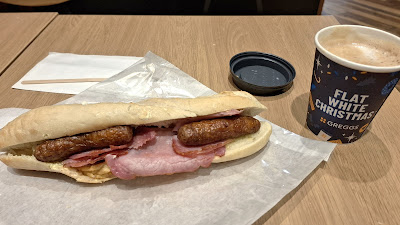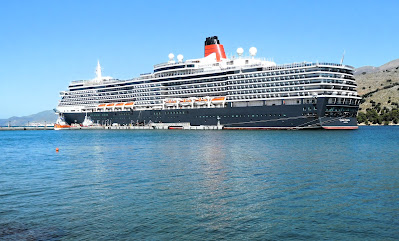As 2024 rapidly approaches its conclusion, and after a reflective look back from a beer and visiting different places perspective, there’s one final task to undertake, before drawing the curtain on the year. As I said last year I’ve never really ran with the “Golden Pints” idea, even back in its heyday a decade or so ago, and now I see it’s more of a lingering beer blogging tradition than anything else.
Perhaps it needs putting out of its misery, although veteran bloggers Boak & Bailey don’t think so, but for now, I’m going for what will probably be the last Golden Pints, mainly to tidy up a few loose ends. I didn’t spend a lot of time over it, and there’s certainly been no navel gazing when trying to come up with suggestions for each category. The categories themselves seem to have shifted over the years, so I’ve simply gone with the flow, and followed what seemed the best, at the time of writing.
So here goes, these are the beers, beer moments and beer locations that, for me, stood out over the course of last year.
Best beer on home turf
Thornbridge Union Jaipur. Brewed using one of the rescued, Burton Union sets, recently acquired by the brewery. I enjoyed a couple of pints of this incredible beer, at Fuggles Beer Café in Tonbridge, although, regrettably, I haven’t come across this rather special beer since.
(For those who’ve been hiding under a stone, during the last year, the Burton Union system is a means of clarifying fermenting beer and separating off the yeast. It was once commonplace, especially in the town from which it takes its name, but due to the high maintenance costs involved with such a system, has gradually been dropped.
Bass scrapped their unions, back in the mid 1980’s, leaving Marston’s as the sole custodians of this unique system. The inevitable happened in 2024, when Marston’s parent company, Carlsberg – a company only interested in promoting its own bland, pilsner-style lagers, pulled the plug. Renowned Derbyshire based brewers, Thornbridge bought one of the redundant sets, and I believe at least one other independent brewer, did the same.
Best beer abroad
Mystery beer at Cafè Can Martí, Majorca. Last June, on a blisteringly hot day, in the narrow back streets of Palma de Mallorca’s old town, and desirous of a refreshing, cold beer, I found the excellent, Cafè Can Martí. I sat at one of the shady tables at the front of the café and ordered myself a spot of lunch. My order quickly arrived, and it was one of the best tortilla de papas (Spanish Omelette) I have ever experienced. Naturally I ordered a beer and given the scorching hot temperatures (mid 30’s), that beer really hit the spot. Despite asking the waitress for details, I have no idea what brand, or even what style it was, but it was dark amber in colour, apart from a feeling it was a beer from the San Miguel stable.
The café itself has received rave reviews, online, and fortunately its name was “in shot” on my photo, otherwise I’d never have tracked it down.
Best location on home turf to enjoy a beer
The Vine, Brierley Hill. The brewery tap for the excellent Batham’s Brewery, situated just behind the pub. The first pub I’ve seen in a long time where customers queue outside, waiting for opening time. With good value beer, and equally good value food (beef pie, chips, peas & gravy), what more could you want on a Friday afternoon? Apart from perhaps, a couple more pints of Batham’s, whose mild was equally as quaffable as their Best Bitter.
Best new pub find
Wheatsheaf, Jarvis Brook. An attractive looking, white painted, weather boarded, Harvey’s tied house, dating from the 1700s. Set on the edge of woodland with two bars, open fireplaces and, at the time of my visit, Harvey’s delectable, Old Ale. My visit to the Wheatsheaf, last October, was well worth the 30-minute walk down from Crowborough Cross, or the 10-minute walk to Crowborough railway station, for the return journey.
Best brewery visit on home turf
Five Points Brewing. For the first time since before the pandemic, I managed to visit a brewery. The brewery in question was Five Points, who are based in Hackney, and their light and airy taproom that, adjoins their brewery, acted as a venue for last August’s summer party, organised by the British Guild of Beer Writers. There was plenty of beer from Five Points, plus some excellent pizza, and those of us sufficiently interested, were given a guided tour of the adjacent brewery. Although the brewery, which was commissioned in 2015, is all shiny, stainless steel, it operates along traditional lines with mash tun, wort kettle, and whirlpool. Keg accounts for 75% of Five Points output, with cask making up 20%, and the remaining 5% being bottled beer.Best brewery visit on foreign soil
Estrella Galicia. Regrettably, I didn't visit any foreign breweries during 2024, although I could have taken a tour of the Estrella Galicia plant, when our cruise ship docked at La Coruña, on Spain’s Atlantic coast. Btw, this company should not be confused with Barcelona’s much better known, Estrella Damm , brewery.
Best beer city
Not so much a city as a distinct area of the West Midlands, the Black Country wins hands-down here, with locally brewed beers from the aforementioned Batham’s, along with Holden’s, plus two surviving traditional, brew-pubs. These are the Beacon Hotel at Sedgley - home to the Sarah Hughes brewery, plus the equally famous Old Swan at Netherton, also known as Ma Pardoe’s.Best beer festival(s)
Cooper’s Arms, Crowborough. The Dark and Delicious Winter Beer Festival is an annual event hosted by the Cooper’s Arms, Crowborough, at the end of January. It normally features a dozen or so strong, “winter ales”, most of them on the dark side, although not exclusively so. In 2024, participating brewers included Burning Sky, Goacher’s, Arkells, Kernel and Tonbridge. There was also a couple of aged casks from Dark Star (Critical Mass) and Moor Beer (Old Freddy Walker).Dovecote, Capel, near Tudeley. The pub holds two beers festivals each year, the first being a Green Hop Festival, during late October, plus its own Dark Beer Weekend which takes place in February. Both festivals are quite low-key events but are none the worse for that.
Best beer city
Bath. If we're talking about a city, then Bath ticked all the right boxes, back in November. This was my second pub related visit to this charming Georgian city in two years, with the wonderful Raven pub coming out tops for both beer and food.
Best day out
Salisbury. I’ve already mentioned the Black Country and Bath, so the day I spent on my own, visiting the historic city of Salisbury has to feature here. My trip there, back in May, represented my first visit to this charming Wiltshire town, since a since a brief stop over there whilst en route to Cornwall by coach. It therefore represents, my first proper visit to Salisbury.Best beer book
Cask – The Real Story of Britain’s Unique Beer Culture, by Des De Moor. Unlike 2023, when I confessed that I hadn’t yet read Des’s book, I ploughed my way through this this meticulously researched, and well written book, eventually completing it in May last year. As well as a real labour of love, it is almost certainly the definitive book on cask conditioned beer, or "real ale" as CAMRA still like to call it. Cask isn’t an easy read, and from a casual reader’s point of view, the book is far too long, but if you’re prepared to stay the course it’s well worth the effort.
Best new location UK
Northumberland. A new, and unexplored part of the country for the Bailey family, and we really liked what we saw. Friendly people, attractive and well-kept towns, unspoilt and uncrowded beaches, and plenty of history. We based ourselves in the town of Alnwick, and enjoyed a real relaxing early autumn break, despite the lengthy drive, there and back.
Bucket list places visited for the first time
Rome. Whilst not on my original list, bucket the chance to visit the eternal city was not one to be missed, and on a blistering hot, midsummer day I was part of a tour party from the Queen Anne cruise ship, as we trudged around the Colosseum, the Circus Maximus, the Forum, the Vatican and St Peter’s Square. Worth it, on its own, for the history and the sightseeing experiences. Cordoba. Again, not on my original list, but no one should turn down the opportunity of visiting this fascinating city. Set in the heart of Andalusia. Cordoba has links to three of the world’s major religions - Judaism, Christianity and Islam, with monuments and relics dating back to the middle ages, and before.That’s it, as far as any “Golden Moments” are concerned. There’s probably stuff that I’ve left out, but it’s getting late, and I need to see the New Year in. Speaking of which, wishing all readers, commentators and critics, all the best for 2025, and thank you for your encouragement and support over the past year.
























































